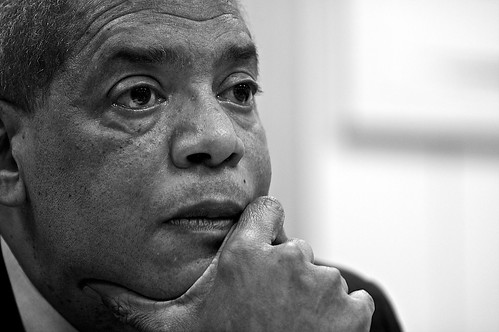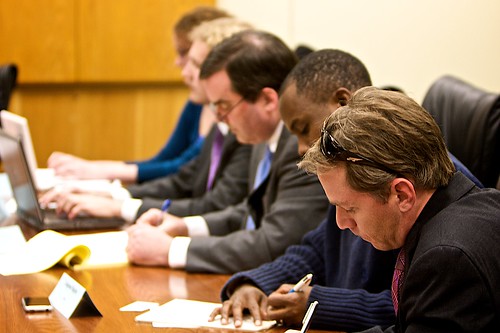
‘WMATA Blogger Roundtable’
courtesy of ‘Samer Farha’
[Editorial update: We had no idea Catoe would tender his resignation today. And apparently, neither did anyone else at the meeting, except for Mr. Catoe.]
Wednesday afternoon at Metro HQ, we had a chance to sit down with the General Manager, John Catoe, along with ten of our closest blogfriends here in the District. No limits, all on the record, just our recorders and our questions and him. Before we get into the rest, I’d like to thank our contact at Metro, Ron Holzer, for putting this together. Getting direct access to the head of the transit agency is a pretty special thing, and I thank him for the opportunity.
If you’ve ridden Metro in the last few weeks, you’ve experienced the worst that the system has to offer: long delays, packed trains and stations, the system is at a boiling point. Tempers flare from riders and employees, and things are out of hand. We talked a bit about the root causes of the situation we’re in, and much leads back to the Crash of June 22nd. Metro relies on its Automatic Train Operation (ATO) system to operate at its highest efficiency levels. ATO allows for higher speeds, better control in a delayed operation situation, and right now it’s not available to the operations staff. That’s a choice made by Catoe and the Metro Board, until such time as they have the final NTSB report, and until they have the realtime detection system in place and operating. That’s months away at this point, with no clear timetable in place other than “this year.”
Better than that, Catoe admitted that they’re having an engineering problem since they went to mixed-model trains (to move the 1000-series cars to the center of trains) with doors not operating properly and sometimes not accepting the proper signals to close or open, which has lead to some of the platform crowding that we’re seeing on a daily basis. So that’s where we are. And we’re likely facing that sort of delay well into the Spring, when we’re looking at potential fare hikes and service cuts. But what about that shortfall?

‘WMATA Blogger Roundtable’
courtesy of ‘Samer Farha’
Catoe spoke at some length about the options they’re considering to cover the $40M shortfall that they’re facing for FY10, which ends in June. They’ve announced a public hearing on January 27th to solicit feedback from the public regarding the proposed options. Participants will also be given a set of stickers to help vote on options that are presented, and that information will be taken to the board. Details on that activity are still evolving, and I’m hoping that they’re going to expand that process to the online world for those who aren’t able to be there in person on the 27th. We’ll be following up with Lisa and Ron at Metro about details on that one in subsequent columns.
Mr. Catoe was mum as to which options he would prefer, but he did make sure to point out that the options he brought to the board did not include a fare hike, and that that measure came straight from the board. Catoe brought the Stimulus funding, and Administrative Reductions, as well as “minor” service adjustments, and the use of capital budget funding to handle parts of the ops budget. Don’t expect that a fare hike will be all that we see, either, as a $0.10 hike would raise just $9-11M based on ridership figures. When asked what the worst option on the table was, he had a simple and decisive answer: “Do Nothing,” and “The longer we wait, the more cuts we’ll have to make.” Adding $40M in deficit to the already-projected-$175M deficit facing the board in FY11 would be a catastrophe in the making, with a lack of additional funding expected from the area jurisdictions that comprise Metro’s funding structure.
The topic of personnel issues is a touchy one, as he wants to make sure that no department has been eyed specifically for cuts, but that operating personnel and safety personnel were unlikely to be touched by any future cut. In addition, Metro has made some changes to the working contracts for the superintendents in the system to convert them to At Will Employees as part of their renewed emphasis on service and accountability. While it doesn’t stretch to line managers (rather, their bosses) or to rank and file employees, this may start to emphasize to middle and upper management at Metro that they’re being judged by the success, or failure, of their charges.

‘WMATA Blogger Roundtable’
courtesy of ‘Samer Farha’
Metro’s position is hardly unique, with regard to service cuts and budget deficits. CTA in Chicago has announced that they’ll be cutting 9% of their rail service and 18% of their bus service, and Orange County’s transit system is facing 30% cutbacks in bus service due to the economic downturn and shortfalls in ridership. Metro’s facing those same issues, and on top of the service issues that have become so prevalent across the transit system.
Catoe was at his most human, and his most personally exasperated, talking about riding the rail system. He does ride Metro every day, and every day he’s being stopped by riders who share their disappointment with the current conditions, sometimes in vehement and perhaps profane terms. It’s clear that Catoe is personally upset by the service as it stands, and that he has a very clear understanding of what riders are experiencing. Several of my fellow bloggers shared their own disappointment with the system, and their own movements away from the rail system, to Catoe, and his response was unequivocal: “I’ve seen a service quality issue.”
That’s the first and only admission I can find on the record from Mr. Catoe regarding the state of Metro as it stands. If Metro is only just now recognizing that they have a service quality issue, months into the manual operation mode, then I think we’re in for a rough ride going forward. Mr. Catoe had no answers for why repeated calls to Metro’s customer service lines were going unheeded and answered, but did admit they’re working hard to handle the volume. Administrative cuts will not help, he said, but that they were working as hard they could to handle the issues that were being brought to them by patrons.
The future of Metro is a difficult one. Catoe believes that they’re not past the point of a normal, reliable Metro rail system, at this time. Metro rail needs to replace all of their 1000-series cars, which number more than 300, but even if they placed the order tomorrow, the first of the new cars wouldn’t go into service until 2013. While Catoe was confident they could get the funding for the full replacement of the 1000-series cars, until they go to the Board and make the arrangements, it’s still far from a done deal. When asked about his vision for five years hence, Catoe talked about the replacements for the 1000-series cars, and a diversification of capacity. Currently, Metro believes there’s around a 1 million trip capacity for the Metro Rail system, accounting for a standard working day. While they were able to eclipse that during the Inaugural, that was a constant flow over an entire day. They’re hoping to expand capacity on their bus system, work in partnership with DDOT on their new Circulator and Street Car systems, and encourage the expansion of bus-only lanes throughout the metropolitan area to cope with ever-growing demand.
I must say: I didn’t expect to find myself sympathizing with Catoe as much as I did. There are some decisions he has made that I don’t agree with, but I came away respecting the man more after hearing him out. Metro has a long way to go. I can remember a time in this town when Metro wasn’t the subject of scowls, jokes and exasperation. I can tell that Catoe wants to get it back to respectability, but he can see how long the road back to normal is. I hope that he’ll spend more time being as honest and open and human as he was today. Too often when I see Catoe on TV, or hear him on the Radio, he strikes me as wooden and less than candid. Today was a different side of Catoe, and a side that we should be seeing more of, if Metro knows what’s good for them.
Full Disclosure: Metro made a gift of a Metro System Map to me and the other bloggers at the end of the evening. I kept it. Hell, I’ll probably get it framed.



Aside from the very important content of this post, I just wanted to say that I love Samer’s shots. Wow.
Great work by both Tom and Samer. I *hope* this is the beginning of Catoe and WMATA’s turning point to the positive, but words only go so far after nearly a year of hiccups, failures, and miscues. They need to back up their good intentions with actions, and that will indeed be a hard road to plow here in DC.
I do not envy them the process and hope that eventually I will gladly embrace riding Metro as I once did.
It’s nice to see them talking, but I will never understand why you cut service when asking for more money. I haven’t seen an 8 car train on the Orange Line at rush hour all week.
I’m SO glad to hear Catoe rides the Metro every day – I think that was mainly where my anger was stemming from. It made no sense that people who don’t use a service would try and run that service, especially one so tangible.
On the other hand, I totally agree with Lisa. As an orange AND red line rider (using the two most popular lines and passing through the two most popular stations in one day) I think I’ve got a clear picture of how bad things are and how frustrating it is. I’ve started getting to my station in the morning and riding the Orange line in the opposite direction just so I can board the train without letting five pass me by. The overcrowding is out of hand, and I’m sick of expanding and compromising what once was a perfectly reasonable commute.
I knew Catoe rode the system every day; what’s highly irritating is the fact that it seems like most of the WMATA Board does *not* with any type of regularity.
Awesome write up. It was a pleasure meeting you guys!
Catoe is our George W. Bush. Let’s face it. Good man, poor leader. He’s literally run Metrorail into the ground, while modestly improving bus service. You don’t make a bus man the leader of an overwhelmingly rail system.
Beyond Zimmerman, I don’t see any on the Board who seem competent or interested enough to make the tough decisions. That includes, especially, Jim Graham. Graham doesn’t ride any metro trains or buses and does not empathize with the pain of riders, other than his “poor” consituents who supposedly can’t afford the 10 cent increase to save the system itself.
And now it looks like he has resigned, hearing it all over twitter.
Lisa – you cut service and raise fares when you can’t meet your budget any other way. If Metro had dedicated funding and/or the jurisdictions that Metro serves paid what they should, WMATA would be in a much better financial position.